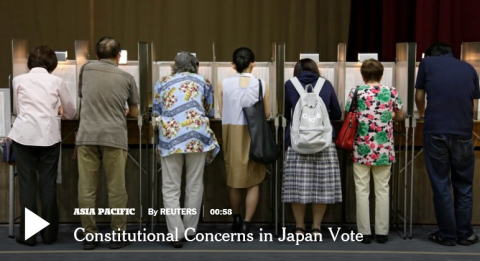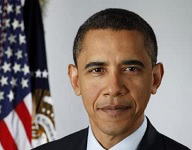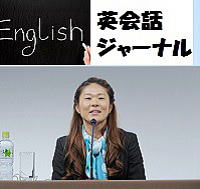箕面.の英会箕面.の英会話教室.:英会話.KEA.−箕面. 小野原、彩都. 茨木話教室.:英会話.KEA.−箕面. 小野原、彩都. 茨木
箕面、小野原、彩都、茨木.の.英会話スクール.です
・個人レッスンが中心です ・講師は日本人!
・英検、TOEIC、ビジネス英語の特別授業も好評です。
ギャラリー
Japan Vote Strengthens Shinzo Abe’s Goal to Change ..お知らせ

Japan Vote Strengthens Shinzo Abe’s Goal to Change Constitution
TOKYO ? Voters helped Prime Minister Shinzo Abe of Japan move closer on Sunday to securing the lawmaker support he needs to revise a pacifist Constitution that has been in place since American occupiers created it in 1947.
An official count on Monday morning showed the governing coalition and its allies had captured two-thirds of the seats in the upper house of Parliament, the amount required to proceed with the constitutional revision.
Despite a weak economy and divided public opinion on the expanded role for Japan’s military that Mr. Abe is seeking, his Liberal Democrats and their allies again won a commanding majority in the upper house.
“This is the people’s voice letting us firmly move forward,” Mr. Abe said. When asked whether he would proceed with a revision of the Constitution, he said it had long been the Liberal Democrats’ goal.
Whether Mr. Abe will be able to pursue that ambition ? to overturn the constitutional clause that calls for the complete renunciation of war ? remains to be seen.
While the partners in the governing coalition have indicated some support for amendments, different groups have divided opinions on which clauses they want to change. Still, the election outcome is sure to give Mr. Abe more leverage.
The results in Japan were achieved without the fiery populist emotions that have fueled the United States presidential race or the recent British vote to leave the European Union. Instead, the Japanese election seemed to reflect resignation with the status quo rather than a broad mandate.
Voters see few alternatives, with many still feeling stung by what they saw as the opposition Democratic Party’s failure to deliver during its four-year term before Mr. Abe came to power in 2012.
“I think people are unhappy, but they don’t really see that voting is going to make things different,” said Jeff Kingston, the director of Asian Studies at Temple University in Tokyo. For Mr. Abe, he said, “the ace up his sleeve is the opposition.”
Professor Kingston added: “There is not an alternative. This is as lukewarm a sense of support as you get.”
As in previous elections, voter turnout was low. The Ministry of Internal Affairs put it at just under 55 percent, only slightly higher than results three years ago in the last upper house election.
During the campaign this summer, Mr. Abe and other Liberal Democrats kept mostly quiet about their revisionist ambitions, which led opposition party leaders and some news media critics to accuse them of a hidden agenda.
Mr. Abe focused mainly on economic policy ? known as Abenomics ? and other less contentious issues, like his promise to expand child care and nursing home slots. Although polls have shown that few Japanese believe the economy is thriving, Mr. Abe spoke with pride of growth in employment, without mentioning that the rise had been mostly in part-time or contract jobs.
“Abenomics is not failing,” Mr. Abe told a crowd of more than 1,000 at his final campaign stop on Saturday evening in Tokyo. “The only choice is to go forward.”
Loyalty to the Liberal Democratic Party runs deep, a product of habit and history as much as support for its policies.
Junko Kaneda, 84, who walked by herself through sweltering heat on Sunday to vote at a polling station in Nakano, a neighborhood in western Tokyo, recalled hiding in bomb shelters during World War II air raids. She said she was concerned about the Abe administration’s moves to revise the Constitution and expand Japan’s military powers.
“But in the end,” she said, “I think all we can rely on is the L.D.P.”
The public remains split over constitutional revision. According to exit polls by NHK, about a third of voters said they supported some amendments, while another third said they saw no need to revise the governing document. Previous news media surveys showed even less support for constitutional revision.
Although the governing coalition achieved the two-thirds threshold in Parliament, it is not clear how quickly it could move to change the Constitution. The Liberal Democrats have also proposed amendments that could limit free speech deemed dangerous to the public interest and expand emergency powers for the prime minister.
The Liberal Democrats will have to work with their coalition partners to gain consensus on which parts of the governing document to change. Any amendments must also be approved by a majority in a nationwide referendum.
“We are talking about a tremendously complicated and contentious political process,” said Tobias Harris, a Japan analyst at Teneo Intelligence, a New York political risk consultancy. “The idea that Abe is just going to be able to get whatever he wants is just not the reality.”
Analysts said the governing coalition was unlikely to start with its most controversial proposal, which would revise the constitutional clause renouncing all war.
Last year, when Mr. Abe pushed through legislation giving the military limited powers to fight in foreign conflicts for the first time since World War II, the move set off enormous protests.
Some analysts said they were concerned that if the governing coalition obtained the two-thirds threshold, it could find a way to sway public opinion in a referendum.
“We have all seen what happened with ‘Brexit,’” said Koichi Nakano, a political science professor at Sophia University in Tokyo, referring to the British vote to leave the European Union. “The results can be unpredictable.”
Professor Nakano noted that Mr. Abe’s administration had sought to quiet critical news media coverage and that, most recently, the party had invited students, parents and educators to file online reports of incidents in which they believed a teacher had violated “political neutrality.”
“I cannot be as naive as to think that there will be free debate in a run-up to a national referendum,” Professor Nakano said.
Other voters were ambivalent. “For revision of the Constitution, I don’t know what we should do,” said Ryuichi Okabayashi, 47, who voted for candidates from opposition parties at an elementary school polling station in Sagamihara, a suburban town southwest of Tokyo. “To be honest, I don’t want to send children to war. But I worry: What if Japan is attacked by China or North Korea? Japan needs military power in such cases.”
Several analysts said Mr. Abe might start with more technical amendments, like one that would change the votes needed to amend the Constitution. “By changing any part of the Constitution, he wants to leave his name in history,” said Ryosuke Nishida, an associate professor of public policy at the Tokyo Institute of Technology.
Japanese voters who selected opposition candidates on Sunday did so less out of passion than of protest. “I didn’t vote for positive reasons,” said Miu Okada, 30, an office worker in Nakano who said she simply chose a candidate who was not a member of the Liberal Democratic Party or its allies.
Sunday’s election was also the first time that 18- and 19-year-olds had
been allowed to vote. Yet many seemed apathetic about their new rights.
Minori Hosaka, 18, a computer engineering major at Tokai University walking
with a friend in the Akihabara district of Tokyo on the eve of the election,
said he was not voting because he had not had time to move his residency
from his hometown to Tokyo. Besides, he said, “I am not sure my own single
vote can affect anything."
英会話教室
関西イングリッシュアカデミー
〒562-0023
箕面市粟生間谷西1−1−2
無料体験レッスン
お問合せ 080-6117-4101
英会話.KEAのホームページをご覧頂きまして誠に有難う御座います北摂(大阪府箕面市東部)にある英会話教室.です。
最寄駅は北千里です。
171号線 小野原交差点からすぐです 地図
*生徒さんの声・反響 >>>
*英会話.レッスン日記 >>>



